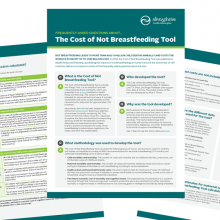Journal article
Apr 26 2021

Misalignment of global COVID-19 breastfeeding and newborn care guidelines with World Health Organization recommendations (Hoang, D.V., 2020. BMJ Nutrition, Prevention & Health)
Guidance documents from 33 countries on newborn care for infants whose mothers are diagnosed with confirmed or suspected COVID-19 were assessed for alignment with WHO recommendations, revealing considerable inconsistencies.
Journal article
Dec 08 2020

Mistakes from the HIV pandemic should inform the COVID-19 response for maternal and newborn care (Gribble, K., 2020. International Breastfeeding Journal)
During the COVID-19 pandemic, policy makers and practitioners must learn from mistakes made during the HIV pandemic, when breastfeeding was undermined through isolating infants from their mothers, and formula feeding resulted in more infant deaths than the disease.
Handout
Oct 14 2020

Frequently Asked Questions about the Cost of Not Breastfeeding tool
Not breastfeeding leads to more than half a million child deaths annually and costs the world economy up to US$1 billion a day.
Journal article
Jul 16 2020

Long-term consequences of stunting in early life (Dewey, K., 2011. Maternal & Child Nutrition)
This review summarizes the impact of stunting, highlighting the growing evidence of the connections between slow height growth in young children and impaired health, education, and economic performance later in life.
Journal article
Feb 25 2020

The cost of not breastfeeding: global results from a new tool (Walters, D., 2019. Health Policy and Planning)
A billion dollars and two thousand lives, every day. This impactful study, which is the foundation for Alive and Thrive’s online tool, examines the human and economic costs of not breastfeeding.
Journal article
Feb 21 2020

Social, economic, and political events affect gender equity in China, Nepal, and Nicaragua: a matched, interrupted time-series study (Nguyen, T., 2020. Global Health Action)
This study suggested that supportive social and political environments can play an important role in empowering women, which in turn advances human rights and promotes health and well-being of individuals, households, communities, and countries.

